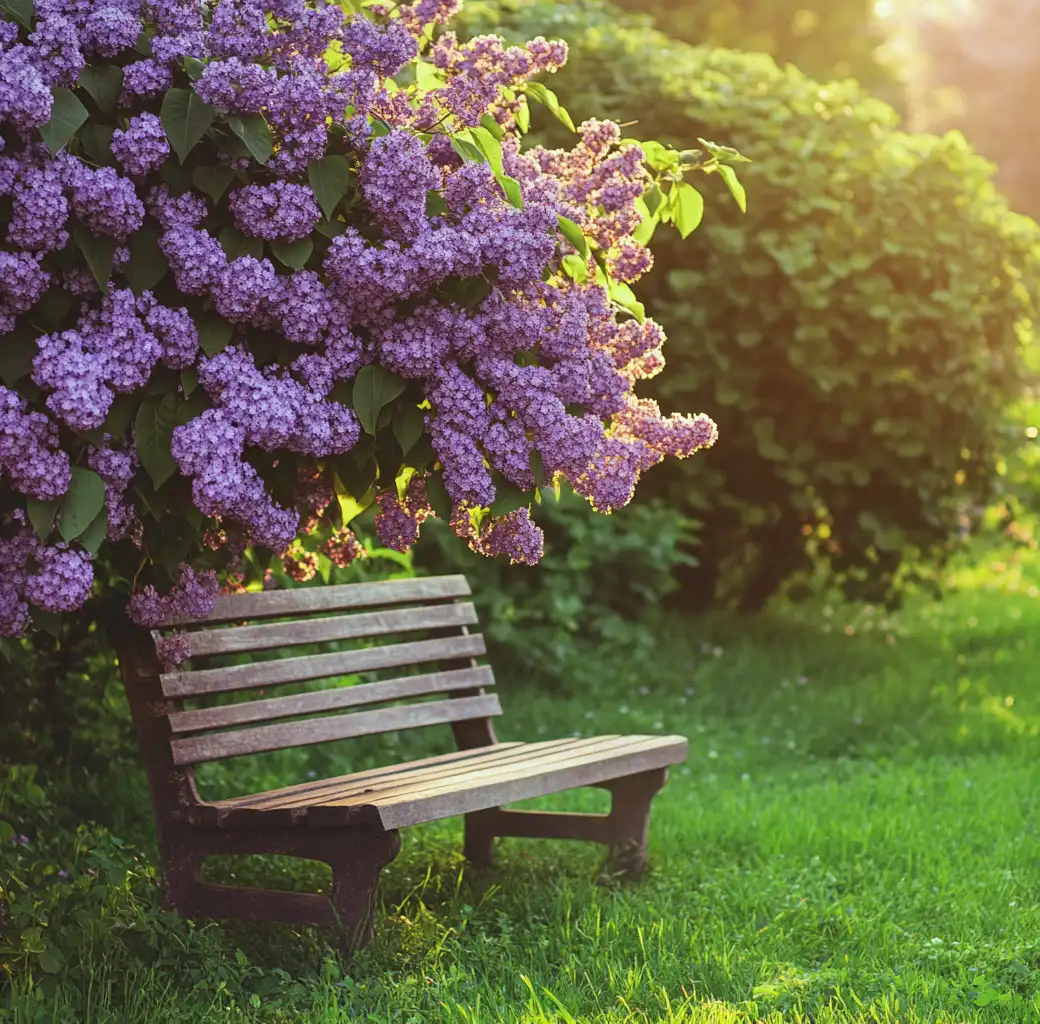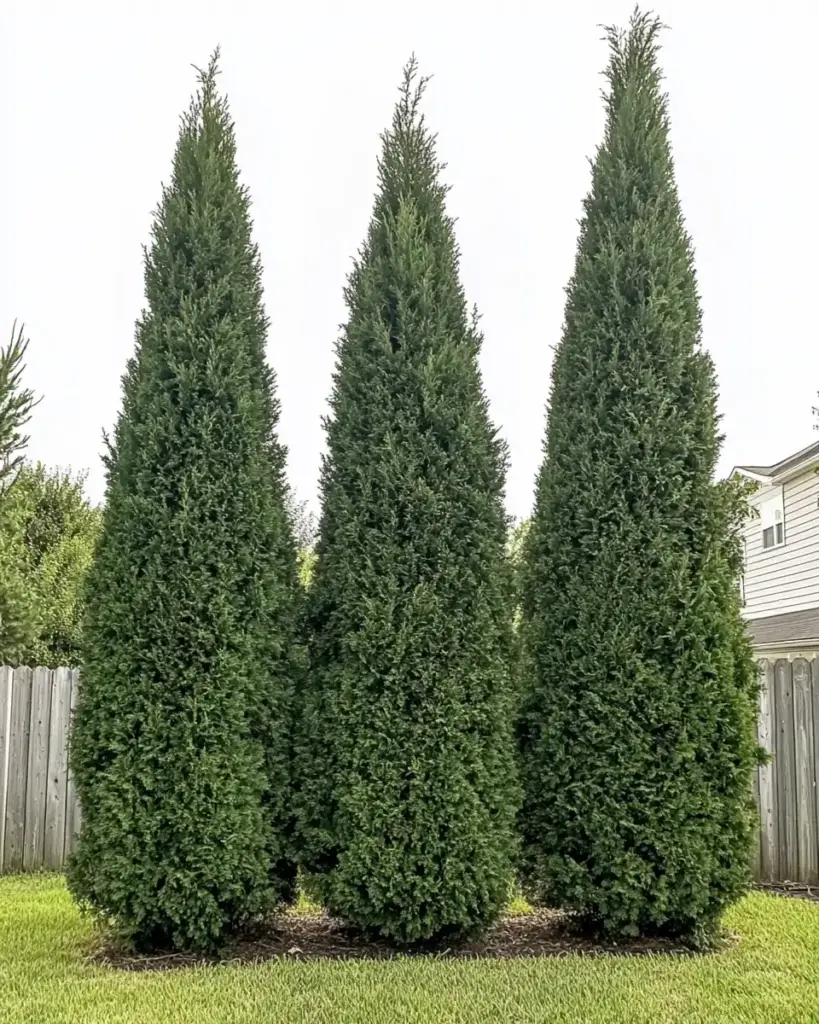If you’re dreaming of a peaceful, secluded backyard sanctuary, selecting the best trees for privacy is one of the most natural and beautiful ways to achieve it. Unlike harsh fences or prefab panels, privacy trees form a living green wall that softens your landscape, reduces noise, and draws in birds, butterflies, and pollinators—all while enhancing your garden’s visual appeal.
Whether you’re blocking the view from a neighbor’s window or shaping a private nook for reading or relaxing, the best trees for privacy do more than just screen—they help transform your space into a lush, tranquil retreat. From fast-growing evergreens to vibrant flowering shrubs, there’s a tree for every yard size, garden style, and privacy landscape need.
Before you start planting, take time to assess your USDA Hardiness Zone, available space, and the ideal height and spread for your privacy hedge. With thoughtful choices and a clear plan, your living screen can become one of the most admired features in your yard—beautiful, functional, and naturally inviting.
Table of Contents
🌲 1. Arborvitae: A Classic Evergreen for Effortless Screening
When it comes to the best trees for privacy, Arborvitae is often a top choice—and for good reason. This versatile evergreen is not only fast-growing but also adaptable to a range of climates and landscape designs. Its dense, columnar form makes it a natural alternative to fencing, ideal for forming uniform hedges or creating a dramatic green wall.
Available in a variety of sizes and shapes, Arborvitae offers flexibility for both small yards and expansive properties. Popular cultivars like ‘Emerald Green’ stay compact while still reaching 10 to 15 feet tall, perfect for lining property boundaries without overwhelming nearby plants. For larger spaces, ‘Baby Giant’ delivers rapid growth and thicker coverage.
Why it’s a standout:
- Low maintenance: Requires minimal pruning to maintain shape
- Year-round greenery: Holds its foliage and color even through winter
- Wildlife-friendly: Provides shelter for birds and small animals
- Zone range: Thrives in USDA zones 3 to 9, making it widely adaptable
Whether planted in a single row or staggered for a natural look, Arborvitae is a reliable go-to for homeowners seeking a fast, effective, and attractive privacy screen.
🌸 2. Viburnum: A Flowering Favorite with Flexible Form
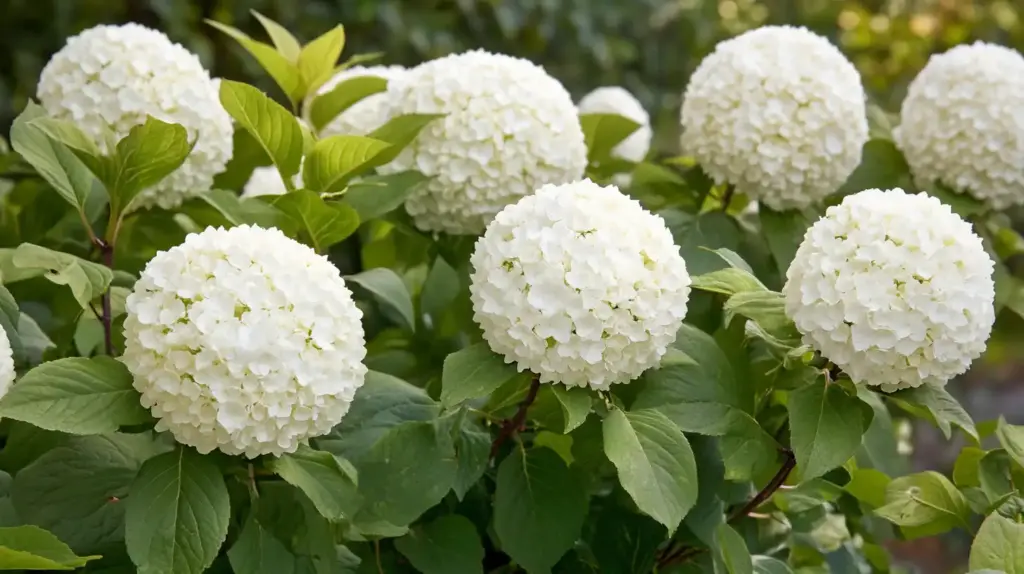
For gardeners who crave both privacy and seasonal beauty, Viburnum is a versatile gem among the best trees for privacy. These deciduous or semi-evergreen shrubs (some even qualify as small trees) offer a perfect blend of lush foliage, spring-to-summer blooms, and—on many varieties—bright berries in the fall.
Viburnums range in size from compact 3-foot dwarfs to statuesque 10-foot varieties, allowing you to tailor your hedge to your garden’s needs. Their ability to adapt to pruning means you can sculpt them into a neat hedge or let them grow freely into a more natural barrier.
Standout varieties like ‘Juddi’, ‘Snowball’, or ‘Summer Snowflake’ boast fragrant white or pink flowers that attract pollinators. After blooming, some varieties produce clusters of red to blue berries, which are beloved by birds and wildlife.
Why it earns a place in privacy gardens:
- Multi-season interest: Flowers, foliage, and berries provide year-round appeal
- Customizable growth: Great for formal or informal privacy screens
- Wildlife-friendly: Supports local ecosystems
- Zone range: Hardy in USDA zones 3 to 9
If you’re looking for privacy with a splash of seasonal charm, Viburnum is a top contender that delivers more than just coverage.
🌼 3. Hydrangea: Blooming Beauty with Backyard Benefits
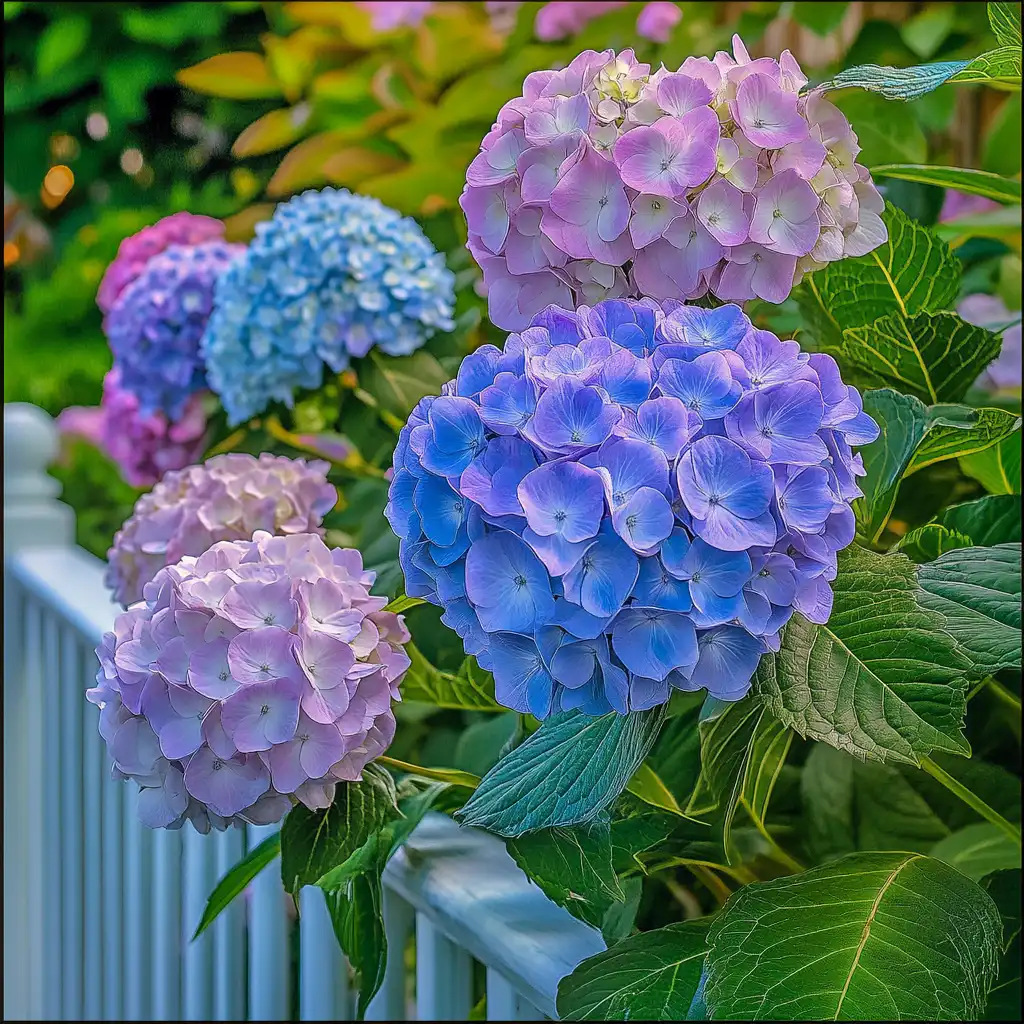
Hydrangeas might not be the first plant you think of when considering the best trees for privacy, but these showy shrubs can pull double duty—providing both visual screening and jaw-dropping floral displays. With their large, globe-like flower clusters and lush green foliage, hydrangeas bring elegance and color to any privacy planting.
Best suited for partial shade to full sun, hydrangeas thrive in rich, well-drained soil and typically bloom from early to late summer, depending on the variety. When planted in groups along a fence or property line, their broad growth habit and thick leaves create a semi-private barrier with ornamental appeal.
Popular varieties like ‘Vanilla Strawberry’, ‘Fire Light’, and the ever-reliable ‘Endless Summer’ are favored not just for their extended bloom times but also for their ability to thrive across a wide range of climates.
What makes them privacy-worthy:
- Extended blooming season: Flowers last from summer into fall
- Visual impact: Large leaves and bold blooms offer dense coverage
- Seasonal privacy: Great for summer months when outdoor time peaks
- Zone range: Performs well in USDA zones 4 to 9
Hydrangeas are ideal if you want your privacy planting to double as a seasonal showstopper—beauty and function, all in one.
🌱 4. Tricolor Willow: Fast-Growing Flair with a Pop of Pink
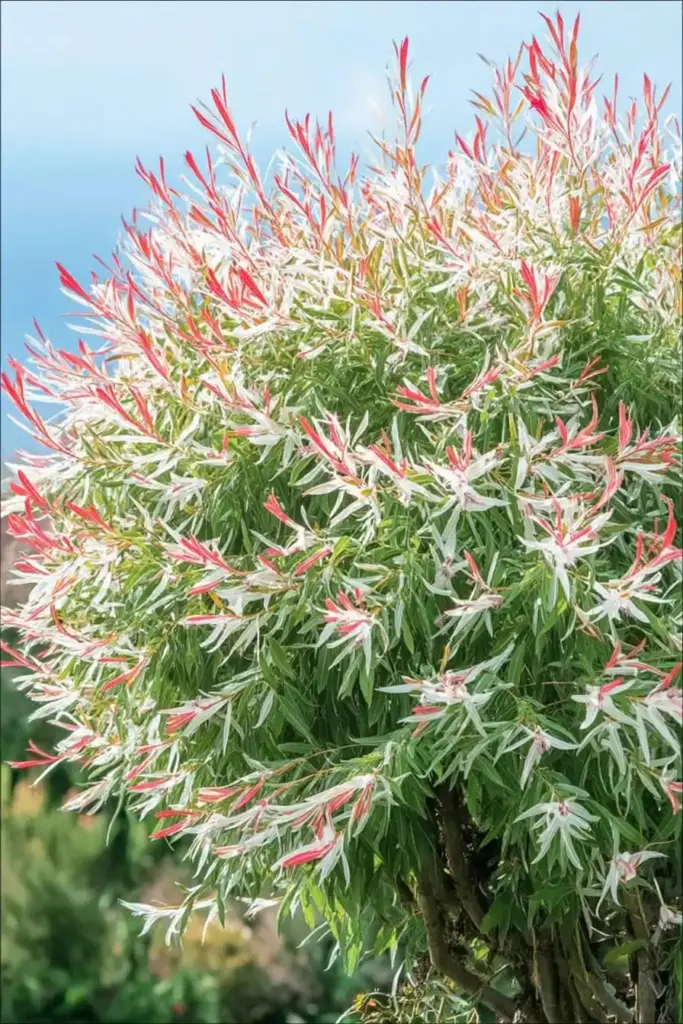
Looking for a privacy tree that grows quickly and offers standout color? The Tricolor Willow is a striking addition to the list of the best trees for privacy, especially for gardeners who want rapid results and unique visual interest.
Also known as Salix integra ‘Hakuro Nishiki’, this ornamental willow features elegant, arching branches with variegated leaves in shades of green, white, and pink. The pink hues emerge on new growth in spring and early summer, making this shrub-like tree a true head-turner during the growing season.
You can train Tricolor Willow into a small tree form or let it grow naturally as a large, rounded shrub. Either way, it provides effective mid-level screening and a burst of seasonal charm.
Why it stands out for privacy:
- Fast-growing: Reaches 8–10 feet in just a few seasons
- Colorful foliage: Adds beauty and depth to your landscape
- Versatile form: Tree or shrub shape depending on pruning
- Zone range: Best suited for USDA zones 5 to 9
The Tricolor Willow is perfect if you want privacy now, with the bonus of artistic foliage that sets your landscape apart.
🌿 5. Skip Laurel: Glossy Green Elegance for Dense Privacy
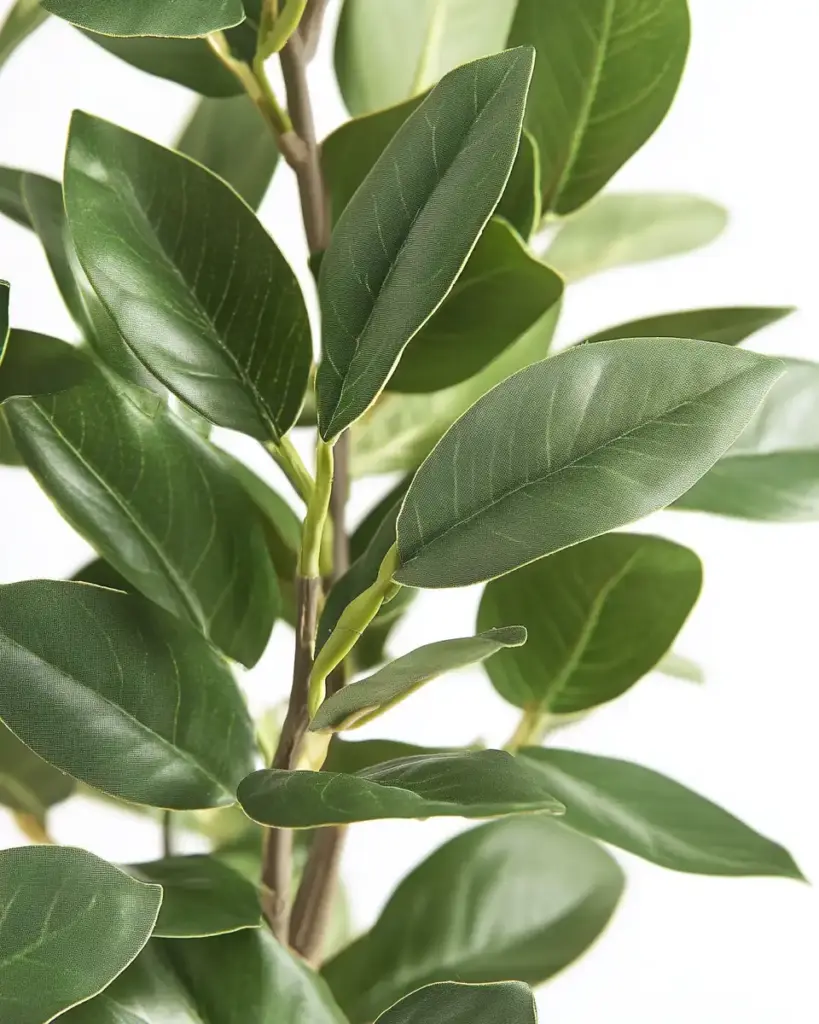
If you’re searching for the best trees for privacy that look as good as they perform, Skip Laurel (also known as Cherry Laurel ‘Schipkaensis’) deserves a top spot on your list. With its glossy evergreen leaves, dense growth habit, and tolerance to tough conditions, this shrub/tree hybrid is a favorite among landscape designers.
Skip Laurel forms a thick, lush screen that remains vibrant year-round. It can grow 10 to 15 feet tall, making it ideal for side yards, property borders, or along driveways where you want privacy with polish. Its natural form is tidy and attractive, but it can also be shaped into a formal hedge with light pruning.
Another reason gardeners love Skip Laurel? It’s deer-resistant, tolerates poor soils, and grows well even in part shade, giving you flexibility where other privacy trees might struggle.
Why it’s a reliable privacy plant:
- Dense evergreen foliage: Blocks views and buffers noise
- Low maintenance: Minimal pruning needed for shape
- Hardy and adaptable: Resilient in urban and suburban settings
- Zone range: Thrives in USDA zones 5 to 10
For a refined, year-round privacy solution that’s as tough as it is beautiful, Skip Laurel is a stellar choice.
🌼 6. Fragrant Tea Olive: Sweet Scent and Subtle Screening
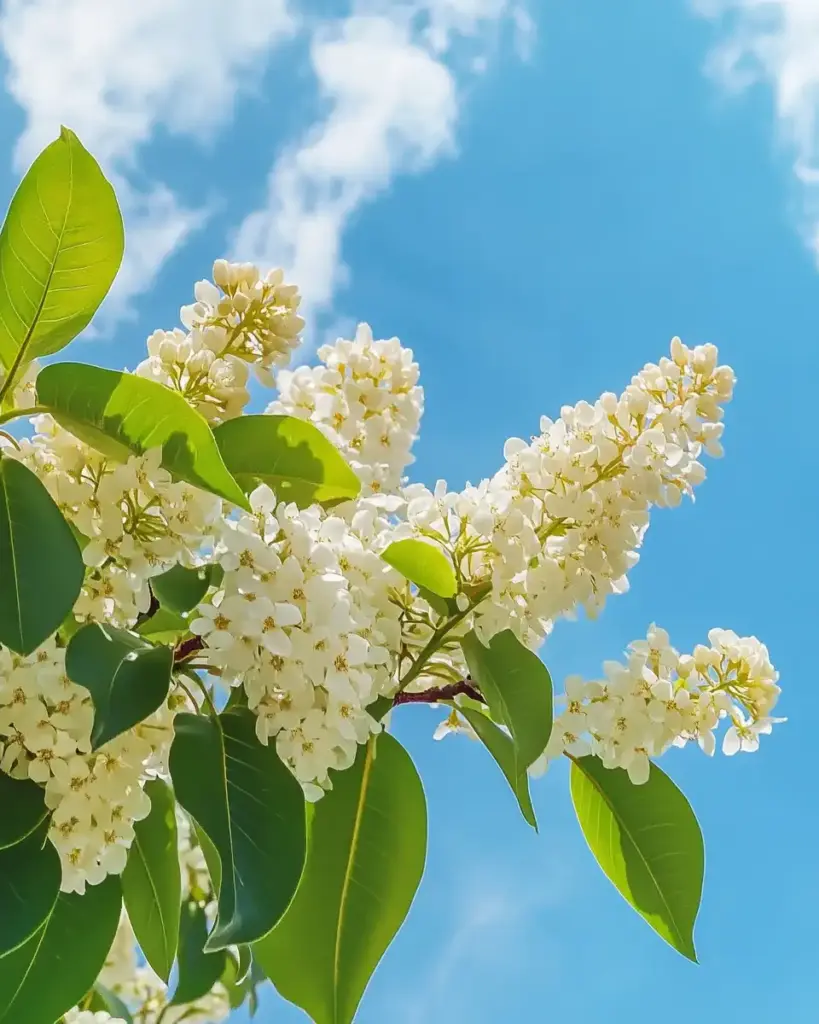
For those who value fragrance as much as privacy, the Fragrant Tea Olive (also known as Osmanthus fragrans) offers a sensory treat that makes it one of the best trees for privacy in warmer climates. This slow-growing evergreen produces tiny, gardenia-like flowers that fill the air with a sweet, jasmine scent—especially in late summer and fall.
Though its growth rate is leisurely, Fragrant Tea Olive develops into a dense, upright shrub or small tree that can be pruned into a hedge or left to form a natural screen. The dark green, glossy leaves give it a refined look, making it a lovely addition near patios, porches, or walkways where its aroma can be fully appreciated.
Ideal for southern landscapes, this plant prefers full sun to partial shade and needs well-drained soil to thrive.
Why it’s a hidden gem for privacy:
- Fragrant flowers: Adds scent as well as screening
- Dense form: Naturally compact and lush
- Great near outdoor living areas: Enhances sensory experience
- Zone range: Performs best in USDA zones 8 to 11
Fragrant Tea Olive is perfect if you want your privacy planting to engage more than just the eyes—it invites you to linger and enjoy.
🌲 7. Juniper: Tough, Stylish, and Surprisingly Versatile
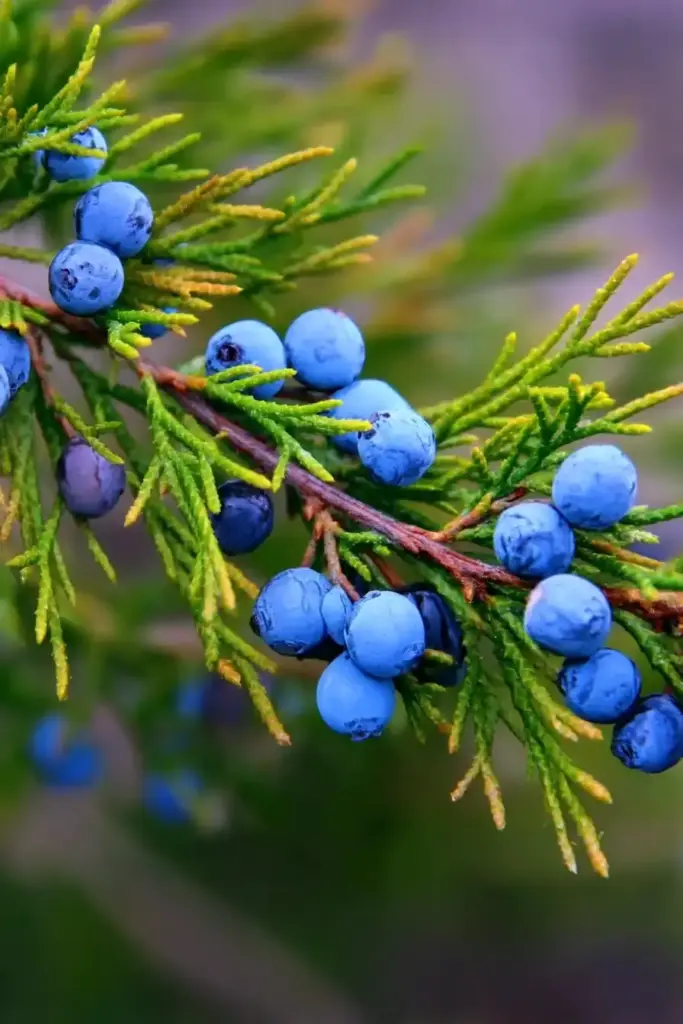
If you’re after year-round screening with a stylish twist, Juniper is one of the best trees for privacy that combines beauty with resilience. Known for its wide variety of forms—from low-growing ground covers to tall, columnar trees—Juniper offers options for virtually every landscape size and style.
Many gardeners love the blue-green to silvery foliage that gives Junipers a cool, clean look, and their evergreen nature ensures consistent coverage throughout the year. One standout variety, ‘Taylor’ Juniper, is often called the “Italian Cypress of the North” because of its slim, upright growth and strong cold tolerance.
Junipers are low-maintenance, drought-tolerant, and resistant to deer and pests, making them a smart choice for tough environments or low-water gardens. Use them as a single specimen or mass-plant in rows for a modern-looking privacy hedge.
Why Juniper earns its place:
- Evergreen and adaptable: Year-round color and texture
- Variety of forms: From spreading to narrow, vertical growth
- Hardy and drought-resistant: Ideal for difficult sites
- Zone range: Suitable for USDA zones 3 to 9
Whether you’re filling a narrow space or designing a formal screen, Junipers give you flexibility without sacrificing privacy or curb appeal.
🌺 8. Camellia: Evergreen Elegance with Seasonal Blooms
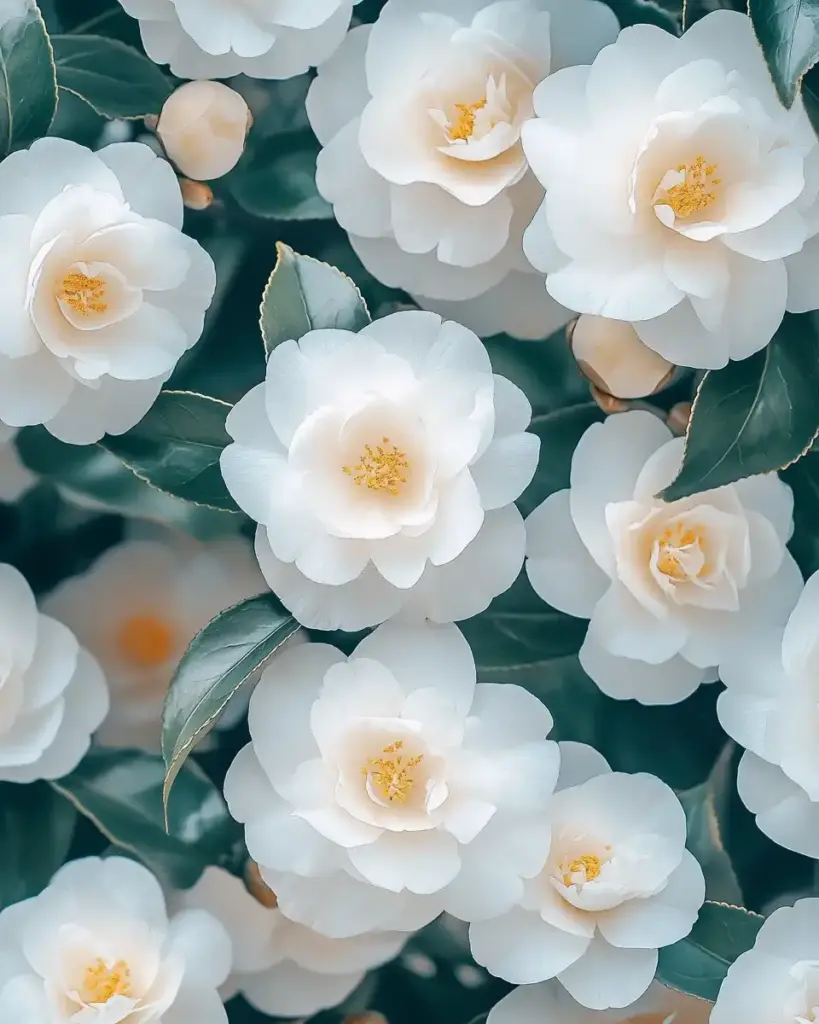
For a privacy plant that doubles as a showpiece, Camellia brings timeless charm to any landscape. These evergreen shrubs earn their spot among the best trees for privacy thanks to their dense foliage and stunning, rose-like flowers that bloom from fall through early spring, depending on the variety.
Camellias thrive in part shade and well-drained, acidic soil, making them ideal for woodland gardens or along shaded property lines. Their glossy, dark green leaves stay lush year-round, creating an elegant natural screen even when not in bloom. Popular varieties like ‘Yuletide’, ‘Pink Perfection’, and ‘Debutante’ offer flowers in vibrant reds, soft pinks, and crisp whites.
While slower growing than some other privacy options, Camellias can eventually reach 6 to 12 feet tall, offering a refined alternative to traditional hedges.
Why Camellia stands out for privacy:
- Extended bloom period: Color when most plants are dormant
- Evergreen structure: Keeps its form and foliage all year
- Perfect for partial shade: Great for understory privacy
- Zone range: Thrives in USDA zones 6 to 9
If you’re looking to blend privacy with beauty—especially in cooler months—Camellias deliver classic garden style with screening power.
🌸 9. Rose of Sharon: Late-Season Blooms with a Vertical Advantage

When summer begins to fade, Rose of Sharon steps in with a dazzling floral display—making it not only a visual stunner but one of the best trees for privacy that continues to impress well into the growing season. This deciduous shrub, part of the hibiscus family, produces large, tropical-looking blooms in shades of white, pink, purple, or blue, often with dramatic contrasting centers.
One of its biggest advantages for privacy is its upright, narrow form, especially in columnar cultivars like ‘Purple Pillar’. This makes it ideal for tight spaces where you want vertical coverage without sacrificing too much horizontal room. Rose of Sharon typically reaches 8 to 12 feet tall, forming an informal hedge or screen with little pruning needed.
It’s also heat- and drought-tolerant, thriving in full sun and average soil, which makes it a great low-maintenance option for summer interest and privacy.
Why gardeners love it for privacy:
- Late blooming: Adds color after most flowers fade
- Tall, upright habit: Great for narrow side yards or patios
- Easy to grow: Minimal care required
- Zone range: Performs well in USDA zones 5 to 9
With Rose of Sharon, you don’t have to choose between beauty and function—you get both, even when other privacy plants are winding down.
🌺 10. Loropetalum: Bold Foliage and Fringe-Like Flowers
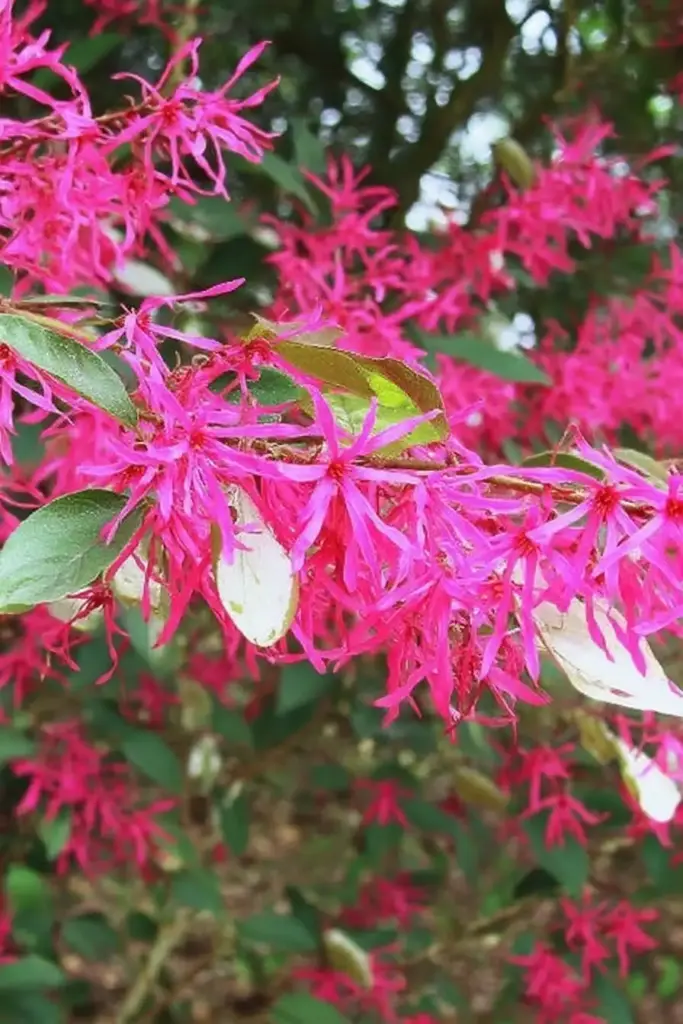
If you’re looking to add color, texture, and privacy all in one plant, Loropetalum (also known as Chinese Fringe Flower) is a standout option among the best trees for privacy—especially in warmer regions. This evergreen shrub features rich burgundy to dark green foliage, depending on the variety, and is accented by fringe-like flowers in shades of pink or white.
Loropetalum naturally grows in a rounded, bushy shape and can reach 6 to 15 feet in height. With minimal pruning, it forms a dense, colorful barrier that holds its leaves year-round. The pop of flower color in spring and occasionally again in fall adds even more visual appeal to your living screen.
It’s also deer-resistant, low-maintenance, and thrives in well-drained soil and full sun to part shade, making it a favorite in both urban and suburban landscapes.
Why Loropetalum is privacy-friendly:
- Year-round color: Evergreen with striking foliage
- Unique flowers: Fringe-like blooms for seasonal interest
- Naturally dense: Great for informal screens
- Zone range: Best in USDA zones 7 to 10
Loropetalum brings beauty and privacy together in one bold package—perfect for gardeners who love a little drama in their hedges.
🌿 11. English Laurel: Fast-Growing Evergreen for Formal Hedges
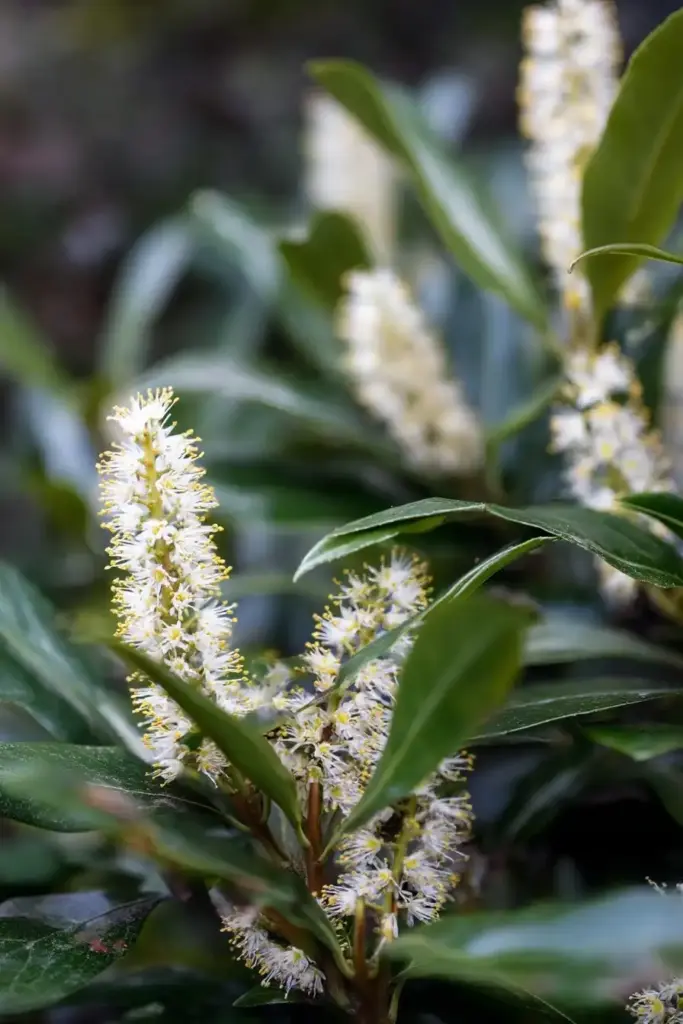
If you need privacy fast and prefer a clean, structured look, English Laurel—also known as Cherry Laurel—ranks high among the best trees for privacy. This evergreen shrub grows quickly and densely, forming a lush green wall that’s ideal for formal hedges or property dividers.
Its large, glossy leaves reflect light and give off a tropical feel, while its fragrant white flowers in spring provide added ornamental value. English Laurel can be trimmed to stay compact or allowed to grow naturally into a thick hedge up to 15 feet tall, depending on variety and growing conditions.
Beyond its good looks, this plant is tough and resilient. It tolerates poor soils, urban pollution, and partial shade, making it an excellent choice for challenging spots where other privacy trees may struggle.
Why it’s a top pick for privacy:
- Fast growth: Fills in gaps quickly for immediate screening
- Attractive foliage: Glossy leaves give a refined appearance
- Easy to shape: Takes well to pruning and formal edging
- Zone range: Suitable for USDA zones 7 to 10
Whether you’re aiming for a manicured border or a natural backdrop, English Laurel delivers speed, beauty, and reliability in one privacy powerhouse.
🌸 12. Lilac: Fragrant Privacy with a Touch of Nostalgia
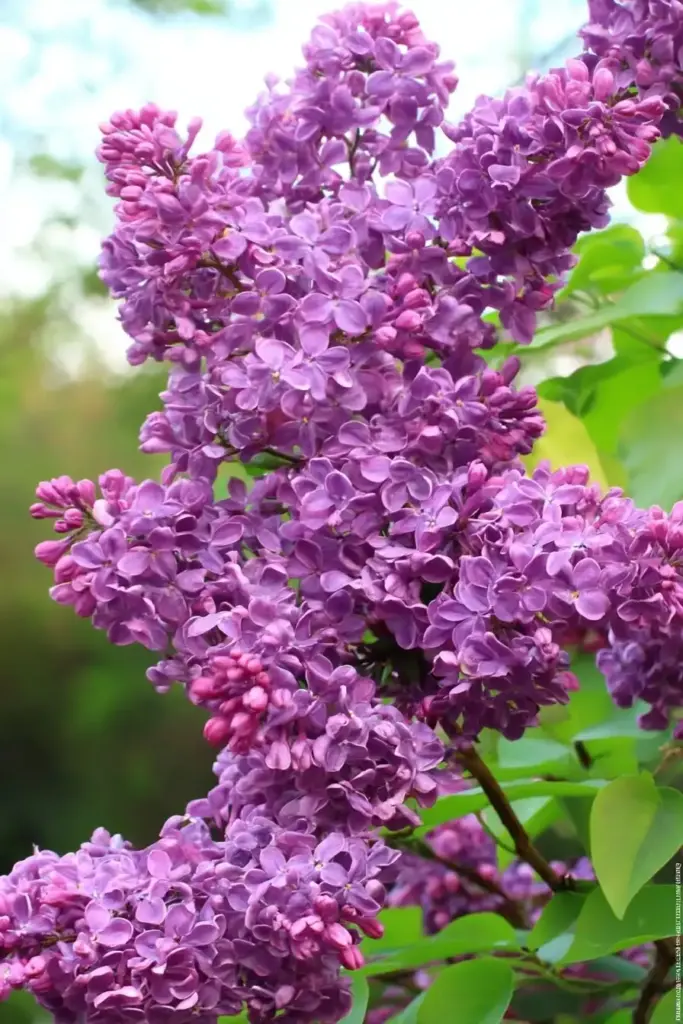
For gardeners who want a privacy screen that smells as good as it looks, Lilac is a timeless favorite among the best trees for privacy—especially in cooler climates. Known for its heavily scented blooms and classic charm, Lilac creates a beautiful and functional hedge during the spring growing season.
These deciduous shrubs grow in a range of sizes, with traditional varieties reaching 8 to 12 feet in height. They form dense thickets of heart-shaped leaves and lavender, pink, white, or purple flowers, offering a fragrant, semi-private screen from late spring into early summer. New reblooming cultivars like ‘Bloomerang Purple’ even offer a second round of flowers later in the season.
Lilacs thrive in full sun and well-drained soil, and while they lose their leaves in winter, their thick summer growth provides great seasonal privacy along fences, property lines, or patios.
Why Lilac is a seasonal privacy star:
- Incredible fragrance: Perfumes your garden each spring
- Classic beauty: Adds old-fashioned charm to any space
- Dense summertime foliage: Effective seasonal screening
- Zone range: Perfect for USDA zones 3 to 7
Lilac is ideal for those who want a privacy plant that brings scent, color, and a bit of vintage flair to their outdoor living space.
🍁 13. Nandina: Compact Color and Year-Round Interest
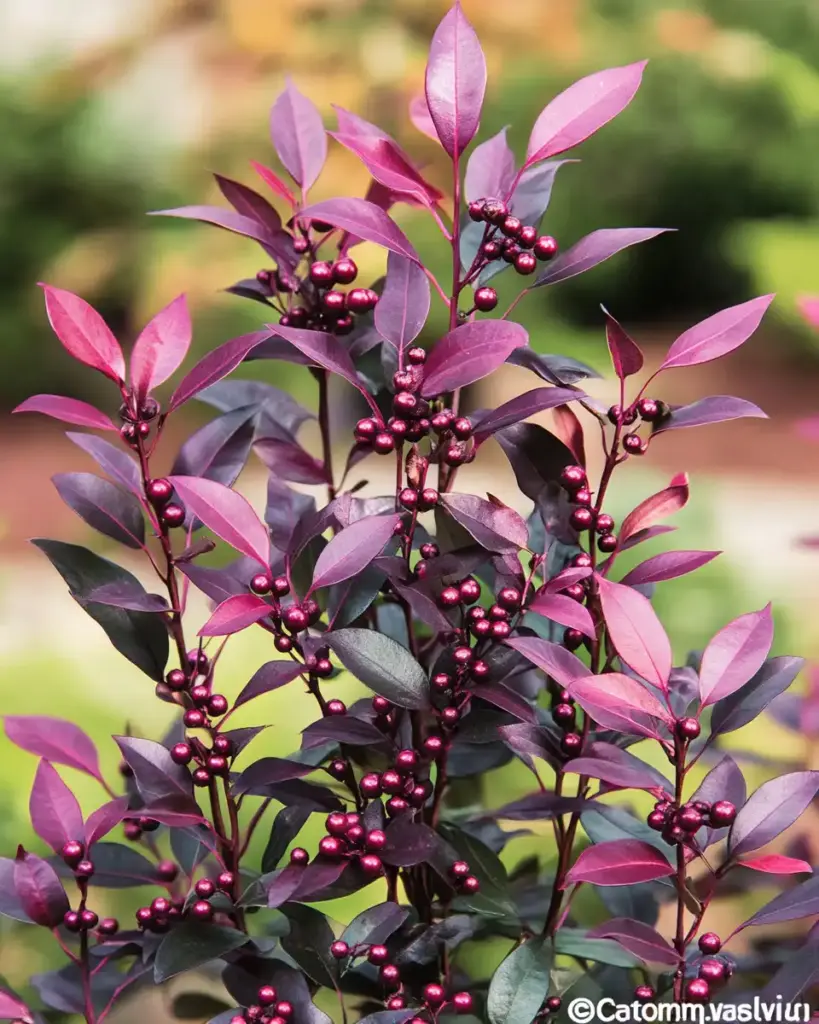
If you’re short on space but still need reliable screening, Nandina—commonly known as Heavenly Bamboo—is a smart, colorful choice among the best trees for privacy, especially for smaller gardens or low hedges. Though technically a shrub, Nandina offers dense growth and year-round visual interest with its changing foliage and bright red berries in fall and winter.
Reaching only 3 to 5 feet tall, Nandina is ideal for lower borders, patio perimeters, or layered planting schemes where taller trees would overwhelm the space. The lacy, bamboo-like leaves emerge in shades of bronze or pink and mature to green, then shift to red in cooler seasons.
Low-maintenance and drought-tolerant once established, Nandina thrives in sun or partial shade and needs minimal pruning to maintain its neat shape. Best of all, it’s resistant to pests and deer, making it an easy addition to any privacy-focused planting.
Why it works well for privacy:
- Compact size: Great for short screens and layered hedging
- Multi-season beauty: Foliage changes color, plus fall berries
- Low upkeep: Virtually care-free once established
- Zone range: Performs best in USDA zones 6 to 10
Nandina may not tower over fences, but for elegant, low-profile screening with a burst of color, it’s a dependable and stylish option.
🌸 14. Rhododendron: Bold Blooms and Broadleaf Screening
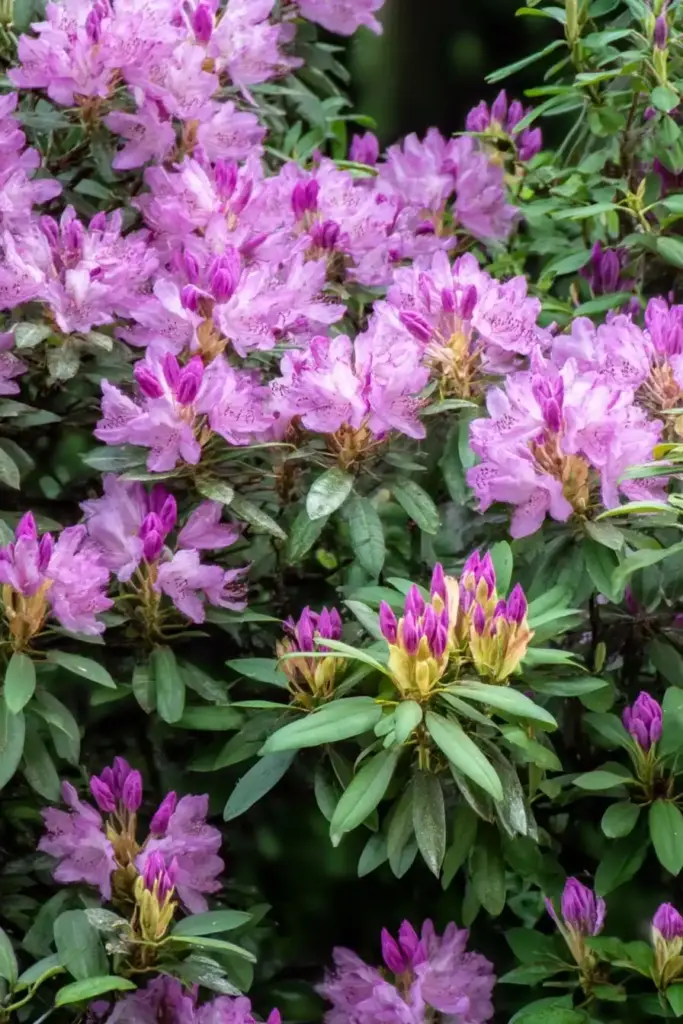
For gardeners in cooler climates who want both bold flowers and evergreen structure, Rhododendron is a standout among the best trees for privacy. With its large, leathery leaves and spectacular spring blooms, this broadleaf evergreen creates a thick, leafy screen that doubles as a floral showpiece.
Rhododendrons come in a wide range of varieties, many of which grow 6 to 10 feet tall, forming a solid visual barrier along borders, foundations, or woodland edges. Their dense growth habit and large leaves provide excellent year-round screening, even when the blooms fade.
These plants prefer acidic, well-drained soil, and do best in partial shade, making them perfect for north-facing yards or shady property lines. The stunning flowers range in shades of pink, white, lavender, red, and even yellow, creating vibrant bursts of color in early to mid-spring.
Why Rhododendron works for privacy:
- Evergreen leaves: Keeps coverage all year
- Massive flower clusters: Brighten up early spring
- Shade-tolerant: Great for woodland or filtered-sun gardens
- Zone range: Performs well in USDA zones 4 to 8
If you want a privacy screen that holds its own through every season and kicks off the gardening year with a bang, Rhododendron is hard to beat.
🌼 15. Forsythia: Early Blooms and Fast-Growing Privacy
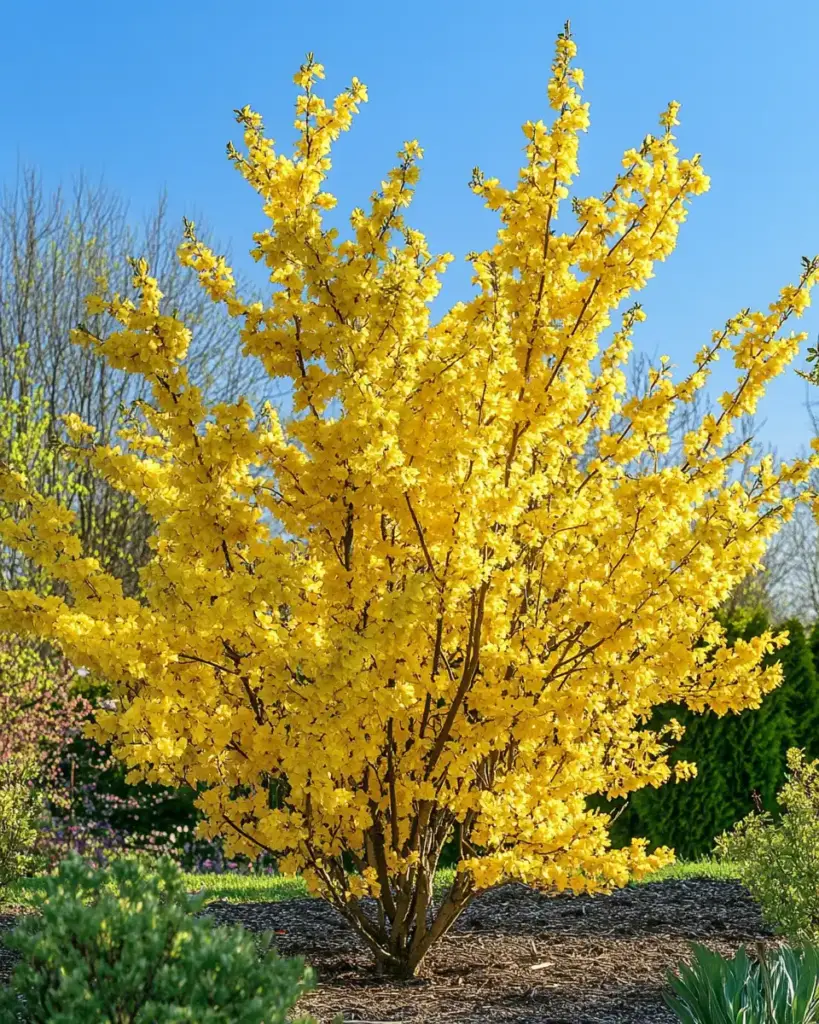
When it comes to early-season color and rapid growth, Forsythia is a top performer among the best trees for privacy. Bursting into bloom before many other plants even leaf out, this deciduous shrub puts on a spectacular display of bright yellow flowers in early spring—just when your garden needs a cheerful boost.
Forsythia grows quickly and can form a dense hedge up to 8 to 10 feet tall, making it perfect for homeowners who want fast, seasonal screening. It thrives in full sun, and once established, it’s drought-tolerant and low-maintenance. While the plant sheds its leaves in winter, its thick branching still offers partial visual protection during the off-season.
Modern cultivars like ‘Show Off’ or ‘Magical Gold’ are more compact and suited for smaller landscapes, while older, larger types can be used to create bold natural fences.
Why Forsythia is privacy-ready:
- Very fast growth: Fills in quickly for immediate results
- Early blooms: Brighten landscapes when little else is flowering
- Tolerant and tough: Low care needs once established
- Zone range: Performs best in USDA zones 4 to 8
For an easygoing shrub that brings golden blooms and reliable seasonal screening, Forsythia is a vibrant, low-effort option worth planting.
❓ FAQ: Best Trees for Privacy
🌳 What are the fastest-growing trees for privacy?
Some of the fastest-growing options include Arborvitae, Tricolor Willow, and Forsythia. These trees and shrubs can establish a dense screen within a few years, making them ideal for homeowners seeking quick coverage.
🌤️ Can I plant privacy trees in partial shade?
Yes! Several of the best trees for privacy thrive in partial shade, including Skip Laurel, Camellia, Rhododendron, and Fragrant Tea Olive. Always check the light requirements for your specific variety before planting.
🏡 What’s the best evergreen tree for privacy year-round?
Arborvitae, English Laurel, and Juniper are excellent evergreen choices that provide consistent privacy through all seasons. These varieties retain their foliage in winter and require minimal upkeep.
❄️ Which privacy trees grow well in cold climates?
For colder zones (USDA zones 3–6), Lilac, Viburnum, Hydrangea, and Juniper are strong candidates. Be sure to select a cultivar that’s hardy to your specific zone.
🧱 Are privacy trees better than fences?
Privacy trees offer several benefits over fences: they’re more attractive, absorb noise, increase property value, and support local wildlife. While they take longer to establish, the long-term payoff can be greater in both function and beauty.
🌿 How far apart should I plant privacy trees?
Spacing depends on the plant’s mature width. For hedging varieties like Skip Laurel or Emerald Green Arborvitae, space them 3 to 5 feet apart for a seamless screen. Always consider mature size to prevent overcrowding.
🌳 Conclusion: Build Your Private Paradise with the Right Trees
Whether you’re hoping to block out a neighbor’s view, dampen street noise, or simply carve out a peaceful retreat, choosing the best trees for privacy is a smart and natural solution. Options like Hydrangea and Rose of Sharon offer colorful, flowering coverage, while dense evergreens such as Arborvitae and Skip Laurel provide year-round protection and structure. With such variety, there’s a privacy tree suited to every climate and landscape style.
To create an effective living screen, be sure to match each species with your USDA Hardiness Zone, available sunlight, and ideal height. This ensures your privacy hedge thrives while adding texture, fragrance, and seasonal color to your garden.
So instead of putting up another fence, why not plant a screen that becomes more beautiful with each passing year? Your tranquil, private haven is within reach—and the best trees for privacy can help you grow it.

